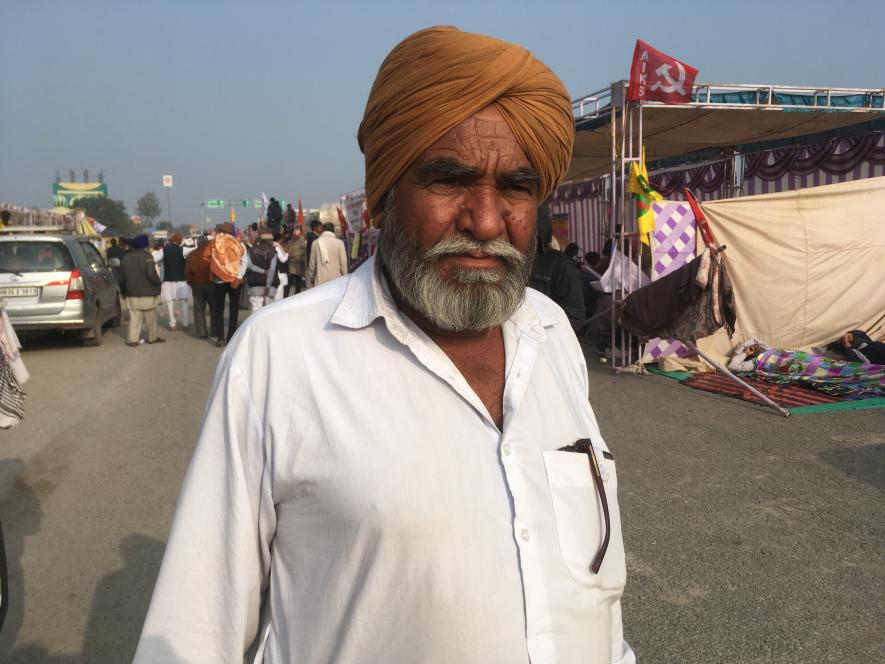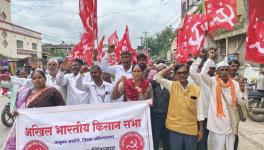Small Farmers Join Protest at Rajasthan-Haryana Border with Local Demands

Dal Singh from Rajasthan’s Gharsana pose for a picture. Ronak Chhabra/NewsClick
Shahjahanpur/Alwar: Some 600kms away from his village in Gharsana tehsil in Rajasthan’s Sriganganagar district, farmer Dal Singh, camping at the Rajasthan-Haryana interstate borders these days, knows well of what it is like to spend nights near a borderline. The national frontier touching neighbouring Pakistan is not more than 15kms away from his village, where he tills around 25 bighas of land.
“Never did I imagine that I will be stopped like this from moving within my own country,” the 62-year old said, facing the barriers erected by Haryana Police at the now fortified NH-8, connecting Delhi to Jaipur.
This, however, is not the only concern that he has right now. “Because of the kaale kaanoon (black laws), the corporate houses will destroy the landowners in the villages,” he said - a fear that is shared by many like Singh, ever since the introduction of the controversial farm laws.
Even as farmers from Punjab and Haryana have remained at the forefront for several months, the movement which demands repealing of the farm legislations and minimum support price (MSP) as a legal right, is now slowly gaining strength from farmers hailing from others states, notably Rajasthan, Gujarat, and Maharashtra. This becomes clearer with the sit-in protest by farmers at one of the carriageways of the Delhi-Jaipur expressway.
“Back in my village, the major issue farmers face is with registering online (a prerequisite for selling the crop produce to government agencies) which usually doesn’t happen on time,” Singh rued. Hence, farmers are usually forced to sell their produce to private traders at throwaway prices. He went through the same this year, selling his moongi produce at a rate that “was nowhere near” to the MSP.
Also read: Protest to Have Far-Reaching Consequences in Haryana, Punjab Politics, Say Farmers
“The situation will only worsen for us if the corporate houses - especially the international groups - are allowed to dictate the terms of the agriculture economy,” Singh told NewsClick, adding, “Angrezan nu massa bhagaya; hun Modi wapas saanu gulam banane chalda hai (we fought so hard to get rid of the British, now Modi is trying to make us slaves again).”
“We don’t want such reforms,” Singh reiterated. “Not only that. Drop the rates of diesel and petrol and control other costs,” he added. “For several years now, farming has becoming increasingly less profitable; how does one sustain only on that nowadays?,” Singh, whose only child has already refused to engage in agriculture and instead entered into a teaching profession, questioned.
Camping near Singh, Rawal Akham “Bura Bhai”, 48, from Dahod, a district in Gujarat covered by forests and majorly populated by Scheduled Tribes, shared the sentiments, even as the issues burdening him are different from that of Singh. “We are four brothers and farming alone is just not enough for us to keep the hearth burning,” said Akham, who grows wheat, channa, and makka - depending on the season - on his three acre land.
Akham also works as an agriculture labourer in other fields. So does his brothers who are engaged in the informal urban economy of Ahmedabad and Baroda. “At the time of sowing or reaping, we come back to our village and provide a labouring hand. During other days, we all are mostly out somewhere doing whatever work we get. But even this all is not enough for a family of six (including his parents), to fetch us two times food on a daily basis,” he said.
Will repealing the farm legislation change it? Not really, confessed Akham. “But then at least it won’t add to our woes, right?” he argued, explaining that the “corporatisation of agriculture” is the last thing that is needed.
Also read: Rajasthan Local Body Polls Over, More Farmers to Join Protest at Delhi-Jaipur Highway
“What we demand back there is actually better irrigation facilities and immediate redressal of the grievances related to the crop insurance schemes,” he added. Further, Akham and the 50 other farmers accompanying him from Dahod demand more jobs under the rural employment scheme and “zameen ka patta (land titles)” to their fellow tribal members.
“Badi yojanayen banati hai sarkaar; par sab paper par hi rehti hai (the government makes a lot of big schemes but they all remain on paper),” he told NewsClick, as focus back on the speech that was being given at the time.
Vijoo Krishnan of All India Kisan Sabha (AIKS) told NewsClick that unlike the other blockades - at Singhu, Tikri, or Ghazipur - on the borders of Delhi, the one at the Rajasthan-Haryana border, which is some 80 kms away from the national capital, is seeing prominent participation from small and marginal farmers. Two hundred trolleys, carrying protesters, from Srigangaanagar are expected to reach the protest venue by the night of December 16. Farmers from Maharashtra will also be travelling to reach here soon, NewsClick has learnt.
On being asked about how the protests are accommodating the issues of these small and marginal farmers, Krishnan said that the ongoing agitation is “above all against the recently-brought agriculture reforms”.
“We had launched a movement back in 2014-15 to press over land rights and against illegal appropriation of it; later, All India Kisan Sangharsh Coordination Committee (AIKSCC) was formed to demand crop price that is 1.5 times over the cost of produce and guaranteed state procurement along with relief-from-debt for farmers,” he told NewsClick.
AIKSCC, along with Punjab farmers’ unions, is also leading the ongoing protests under the banner of Samyukt Kisan Morcha. “Right now, the protests are against the three farm laws and the proposed amendment to the electricity law,” Krishnan added.
Moreover, he said, the demand to enact a law to legalise the MSP arrangement is a “nationwide demand” which will surely benefit “every farmer,” across the economic spectrum. “Their local demands are there and we shall continue to fight for them… It is a long fight. One that will surely press for more anaj mandis, if at all the laws that are feared to ‘dismantle’ them are repealed first,” Krishnan said.
Meanwhile, on a rather cloudy Tuesday (December 15), the protesting farmers here were addressed by the district lawyers from nearby Haryana’s Rewari. Rajendra Singh, 52, told NewsClick that the lawyers stand “shoulder to shoulder” with the protesting farmers. “In the coming days, if required, then we have also decided to extend our legal services to these farmers in return of no money,” said Singh, who is also a member of Rewari district’s Bar Association.
On the third day of their staying put at the interstate border point, a 10-member delegation of railwaymen under the banner of Swatantra Railway Bahujan Karamchari Union (SRBKU) - North Western Railway, have also decided to join the farmers in their struggle.
Also read: Workers Join Farmers’ Protest at Delhi-Jaipur Highway, Caravan Stopped at Haryana Border
Get the latest reports & analysis with people's perspective on Protests, movements & deep analytical videos, discussions of the current affairs in your Telegram app. Subscribe to NewsClick's Telegram channel & get Real-Time updates on stories, as they get published on our website.
























